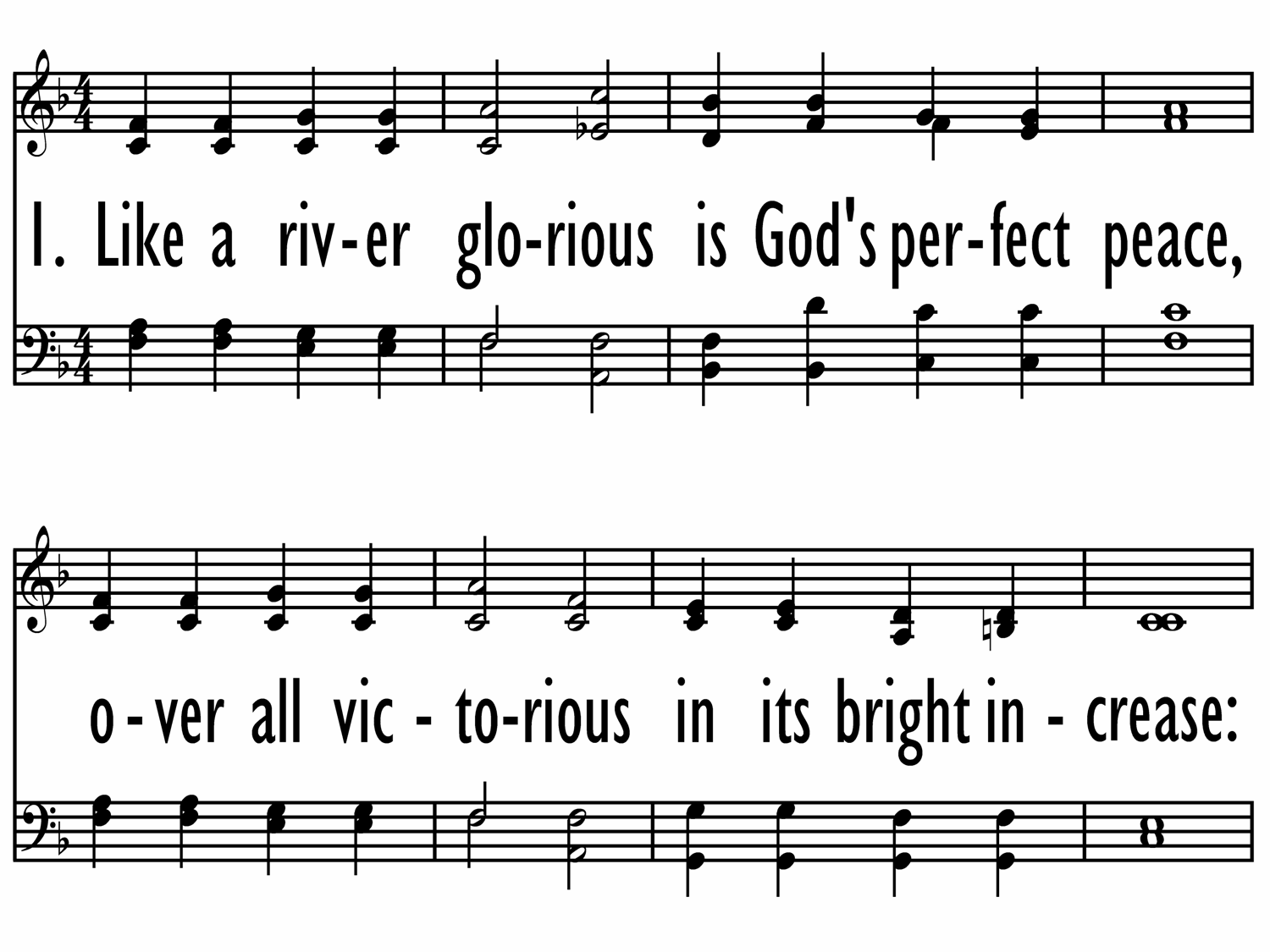- |
User Links
Like a River Glorious


Like a river glorious
Author: Frances Ridley HavergalTune: WYE VALLEY
Songs of Response
Published in 161 hymnals
Printable scores: PDF, MusicXML
Playable presentation: Lyrics only, lyrics + music
Audio files: MIDI, Recording
Representative Text
1 Like a river glorious is God's perfect peace,
over all victorious in its bright increase:
perfect, yet still flowing fuller every day;
perfect, yet still growing deeper all the way.
Refrain:
Trusting in the Father, hearts are fully blest,
finding, as he promised, perfect peace and rest.
2 Hidden in the hollow of his mighty hand,
where no harm can follow, in his strength we stand.
We may trust him fully all for us to do;
those who trust him wholly find him wholly true. [Refrain]
Psalter Hymnal, 1987
Author: Frances Ridley Havergal
 Havergal, Frances Ridley, daughter of the Rev. W. H. Havergal, was born at Astley, Worcestershire, Dec. 14, 1836. Five years later her father removed to the Rectory of St. Nicholas, Worcester. In August, 1850, she entered Mrs. Teed's school, whose influence over her was most beneficial. In the following year she says, "I committed my soul to the Saviour, and earth and heaven seemed brighter from that moment." A short sojourn in Germany followed, and on her return she was confirmed in Worcester Cathedral, July 17, 1853. In 1860 she left Worcester on her father resigning the Rectory of St. Nicholas, and resided at different periods in Leamington, and at Caswall Bay, Swansea, broken by visits to Switzerland, Scotland, and North Wales. She died… Go to person page >
Havergal, Frances Ridley, daughter of the Rev. W. H. Havergal, was born at Astley, Worcestershire, Dec. 14, 1836. Five years later her father removed to the Rectory of St. Nicholas, Worcester. In August, 1850, she entered Mrs. Teed's school, whose influence over her was most beneficial. In the following year she says, "I committed my soul to the Saviour, and earth and heaven seemed brighter from that moment." A short sojourn in Germany followed, and on her return she was confirmed in Worcester Cathedral, July 17, 1853. In 1860 she left Worcester on her father resigning the Rectory of St. Nicholas, and resided at different periods in Leamington, and at Caswall Bay, Swansea, broken by visits to Switzerland, Scotland, and North Wales. She died… Go to person page >Text Information
| First Line: | Like a river glorious |
| Title: | Like a River Glorious |
| Author: | Frances Ridley Havergal |
| Meter: | 6.5.6.5 D with refrain |
| Language: | English |
| Refrain First Line: | Stayed upon Jehovah |
| Notes: | French translation: "Comme un fleuve immense" by E. Schürer; Spanish translation: See "Cual la mar hermosa" |
| Copyright: | Public Domain |
| Liturgical Use: | Songs of Response |
English
- 50 Uncommon Songs: for partakers of the common salvation #22
- Ambassador Hymnal: for Lutheran worship #581
- Baptist Hymnal (1975 ed) #208
- Baptist Hymnal 1956 #294
- Baptist Hymnal 1991 #58
- Baptist Hymnal 2008 #516
- Best Endeavor Hymns: especially for use in Christian endeavor societies, young people's meetings, Sunday schools, and general church work #57
- Bible Truth Hymns #400
- Booth-Clibborn Victory Songs #d56
- Carmina Centum: for Sunday schools and gospel meetings #51 10 shown out of 131
Spanish
Notes
Scripture References:
st. 1 = Isa. 66:12
st. 2 = Ps. 37:24
Frances R. Havergal (PHH 288) wrote this text in 1874 in Leamington, England. First appearing in leaflet form, the text was published in a collection of her poems, Loyal Responses (1878), without music. The Psalter Hymnal version is notably altered from the original three stanzas.
Like “Trust and Obey” (548) and various psalms of trust, this text extols the blessing of trusting in God's care and keeping. Such trust produces serenity (st.… Read More
Scripture References:
st. 1 = Isa. 66:12
st. 2 = Ps. 37:24
Frances R. Havergal (PHH 288) wrote this text in 1874 in Leamington, England. First appearing in leaflet form, the text was published in a collection of her poems, Loyal Responses (1878), without music. The Psalter Hymnal version is notably altered from the original three stanzas.
Like “Trust and Obey” (548) and various psalms of trust, this text extols the blessing of trusting in God's care and keeping. Such trust produces serenity (st. 1), strength to face each day (st. 2), and "perfect peace and rest" (ref.).
Liturgical Use:
As a hymn of trust for many occasions of worship; a sung benediction.
--Psalter Hymnal Handbook, 1987
Read LessAccess an additional article on the Canterbury Dictionary of Hymnology:
Tune
James Mountain (b. Leeds, York, England, 1844; d. Tunbridge Wells, Kent, England, 1933) composed WYE VALLEY for Havergal's text ("Like a river glorious") on one of his first preaching tours through Britain. Throughout his life Mountain was influenced by the Countess of Huntington and her following o…
For Leaders
Text:
Frances Havergal wrote this hymn while she was living at Leamington, England, in 1874. It first appeared with its tune in the 1876 hymnal Hymns of Consecration and Faith under the title “Perfect Peace.” She later published it in her poetry collection, Loyal Responses, in 1878.
This hymn is typically sung in three stanzas. The first stanza uses the image of a river to depict “God's perfect peace.” The second stanza opens with an image of God as having hands, with Christians nestled in His palm.
Tune:
James Mountain's tune WYE VALLEY was written for this text, and is the only tune to which it is sung. It was first published in his Hymns of Consecration and Faith in 1876. WYE VALLEY is a peaceful, simple tune. The frequent repetition of notes and phrases makes this an easy tune for congregations to sing, but the tempo should not rush, or the tranquility of the text and tune is lost.
When/Why/How:
This hymn is suitable for use as a closing hymn, or a song of response. The choir could sing it as a musical benediction, using a setting such as “Like a River Glorious,” which is accompanied by a motif that imitates the flowing of a river. For an instrumental postlude, the piano is an ideal instrument, either in a solo, as in the peaceful piano setting of WYE VALLEY in “Gospel Hymns We Love,” or in an accompanying role, as in the clarinet version in “Clarinet Stylings.”
Tiffany Shomsky,
Hymnary.org
Timeline
Arrangements
Media
Psalter Hymnal (Gray) #560
- MIDI file from Baptist Hymnal 1991 #58
- Audio recording from Baptist Hymnal 1991 #58
- MIDI file from Baptist Hymnal 1991 #58
- MIDI file from Christian Endeavor Hymns #83
- Audio recording from Celebrating Grace Hymnal #60
- MIDI file from The Cyber Hymnal #3776
- Audio recording from Lift Up Your Hearts: psalms, hymns, and spiritual songs #699
- Audio recording from Psalter Hymnal (Gray) #560
- MIDI file from Psalter Hymnal (Gray) #560
- MIDI file from Psalter Hymnal (Gray) #560
- Audio recording from Trinity Hymnal (Rev. ed.) #699
- MIDI file from The Voice of Thanksgiving #60
- Audio recording from Worship and Rejoice #435
- MIDI file from Worship and Rejoice #435


 My Starred Hymns
My Starred Hymns








